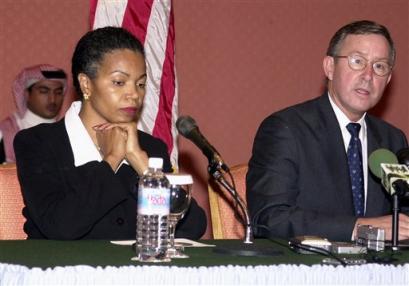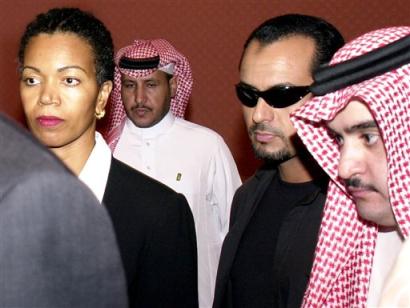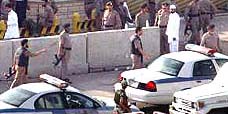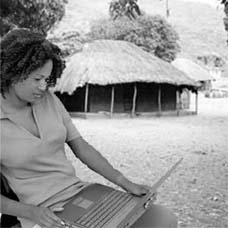December 9, 2004: Headlines: COS - Oman: Saudi Arabia: Terrorism: Diplomacy: Yahoo News: "It's not good to hear gunfire outside your office, but I did have complete faith in the security of the building," Ms. Abercrombie-Winstanley said, referring to the main chancery building.
Peace Corps Online:
Directory:
Oman:
Special Report: Diplomat and Oman RPCV Oman RPCV Gina Abercrombie-Winstanley:
December 9, 2004: Headlines: COS - Oman: Saudi Arabia: Terrorism: Diplomacy: Yahoo News: "It's not good to hear gunfire outside your office, but I did have complete faith in the security of the building," Ms. Abercrombie-Winstanley said, referring to the main chancery building.
"It's not good to hear gunfire outside your office, but I did have complete faith in the security of the building," Ms. Abercrombie-Winstanley said, referring to the main chancery building.

"It's not good to hear gunfire outside your office, but I did have complete faith in the security of the building," Ms. Abercrombie-Winstanley said, referring to the main chancery building.
Freed Captive Tells of Ordeal in Attack on Consulate in Jidda
By NEIL MacFARQUHAR
Published: December 8, 2004
Caption: U.S. Consul General in Jiddah, Saudi Arabia, Gina Abercrombie-Winstanley, left, listens as the U.S. Ambassador to Saudi Arabia, James C. Oberwetter, right, addresses reporters Tuesday Dec. 7, 2004, following Monday's attack on the U.S. Consulate. Islamic militants who shot their way into the heavily fortified U.S. Consulate Monday killing several employees, clearly had studied how cars entered the compound, Oberwetter said Tuesday, praising actions that stopped the assault but acknowledging room for improvement. (AP Photo/Hasan Jamali)
JIDDA, Saudi Arabia, Dec. 7 - One of eight men who were used as human shields during the armed assault against the American Consulate here said Tuesday from his hospital bed that the most vivid moment came when the gunman who was holding him captive and firing across his shoulder ordered him to raise his hands and scream, "God is great!"
The cry is one of the last things a good Muslim hopes to utter before dying, and Abdel Jabar Nirous, a 27-year-old supply clerk from Sri Lanka, was convinced that his life was at an end. He struggled to wrench himself away from the man before passing out.
When he regained consciousness, he said, "I saw my two friends lying dead in front of me and blood everywhere."
The description of what happened inside the compound contradicts statements made Monday by officials in the State Department and the Saudi Embassy in Washington that no hostages were taken during the attack.
The eight men were used as shields for one to two hours on Monday, survivors in King Fahd Hospital said. They were taken outside to a dirt area near the middle of the compound by the attackers, who had breached the security surrounding the heavily fortified consulate.
There the attackers engaged in a gun battle with Saudi security forces and the United States Marines. Three of them were killed and one seriously wounded in the shooting. It is unclear if all of the five consulate employees who died were among those held hostage.

Caption: U.S. Consul General in Jiddah, Saudi Arabia, Gina Abercrombie-Winstanley surrounded by guards as she walks in for a press conference Tuesday, Dec. 7, 2004, following Monday's terrorist attack. (AP Photo/Hasan Jamali)
The most senior American officials in the country, Ambassador James C. Oberwetter and Gina Abercrombie-Winstanley, the consul general in Jidda, defended security at the compound during a news conference on Tuesday, saying the measures had largely worked.
"It's not good to hear gunfire outside your office, but I did have complete faith in the security of the building," Ms. Abercrombie-Winstanley said, referring to the main chancery building.
The consulate's American employees were working in that building at the time of the attack and were taken to a secure area inside the building by marines. Security measures like magnetic doors, as well as gunfire from the marines, kept the gunmen from entering the building.
No Americans died, and two suffered superficial wounds. At some point during the three-hour raid, the attackers pulled down and burned the consulate's American flag.
Mr. Oberwetter sidestepped a question about who was to blame for the security breach that allowed four of the five gunmen - the fifth was shot down in the initial fight at the perimeter - to run into the compound through a gate that was slowly closing automatically behind a consular vehicle that had just entered.
"I think using the word blame is the wrong way to go," he said. "Obviously the events of yesterday show a need for an improvement. We will be examining what additional steps need to be taken."
He said the immediate step asked for was additional security from the Saudi government, and he said he was sure it would be provided. The Saudi cabinet issued a formal condemnation of the attack, but other than that there was only a brief official statement listing the names of three of the dead attackers. It said the fourth had yet to be identified.
Late on Monday, a group known as Al Qaeda in Saudi Arabia took responsibility for the attack in a Web site posting, but the authenticity of the claim could not be confirmed. The men who carried out the attack are believed to be low-ranking members of a cell who were once responsible just for logistics, but after their names were discovered through a series of raids recently around Jidda, they apparently formed an operational unit, said a source close to the investigation.
Mr. Oberwetter said the way the attack had unfolded clearly indicated that the gunmen had studied at least the outer workings of the consulate, a sprawling walled compound of several acres near Jidda's waterfront. Reporters were not allowed onto the scene; the news conference was held in a hotel.
Just as one barrier was being lowered and the hydraulically powered gate was being opened to let in a consular vehicle, the armed men in a car veered across several lanes of traffic and tried to speed into the compound. A heavy barrier raised out of the ground stopped them.
"They clearly understood how our cars entered the compound, and in my view they had scoped it out," the ambassador said, noting that the barrier had worked the way it was supposed to. The gunmen shot at the vehicle that had passed inside, wounding two of the three passengers, and then stormed into the compound on foot before the gate closed.
The attacker who survived was treated for bullet wounds and is in the intensive care unit at King Fahd Hospital, its director, Dr. Sami M. Badawood, said Tuesday.
The fact that the American Consulate had been breached sent a tremor through the community of foreigners here, already heavily depleted after a series of attacks against foreign compounds since May 2003 left more than 75 people dead.
"If anyone can break into the U.S. Consulate, which is the most heavily guarded compound in this city, then we are all vulnerable," said Georgene S. Wade, the director of the American International School.
She said the school, with an enrollment of 600 this year, had already lost scores of students as private American companies followed the lead of the State Department and ordered spouses and dependents to leave the country.
"Anyone willing to risk their lives for the cause, we have no defense against that," she said.
Mr. Nirous said he had been with three others in the general services office when he saw a bearded man in a track suit run by outside the window carrying a gun. At that moment the alarm system began emitting rapid squawks. The employees had been trained to lock all the doors and lie on the floor in case of such an attack, which they did, he said.
About 20 minutes later the gunmen shot through both doors and started shouting at them, "Where are the Americans?" When they professed ignorance they were told to hand over their cellphones and their money and go outside, he said.
Once outside, they were taken to the area near the middle of the compound where four other local employees joined them. Each gunman shielded himself with at least two employees.
"They used us as a barricade," said Latif Aboulhosn, 62, a Lebanese electrician who was shot in the chest and leg. Breathing heavily in his hospital bed, with an intravenous line dripping into his neck, he said he could not be sure who had shot him as he tried to run away from the gunfire. He, too, was asked repeatedly where the Americans were, he said.
Salah Abdel Qawi, a bearded Yemeni dispatcher who also suffered a gunshot wound, said that for the most part the Saudi special forces shooting at the attackers seemed to be trying to pick them off.
When the gunfire intensified, the attackers were all screaming, "God is great!" and the hostages took the opportunity to fling themselves to the ground. He said he remembered trying to press his face down into the dirt. The line between life and death proved a thin one.
A Sudanese colleague lying next to him raised his head to try to figure out what was happening, Mr. Qawi said. "He got shot."
Mona el-Naggar contributed reporting for this article.
When this story was posted in December 2004, this was on the front page of PCOL:
 | Is Gaddi Leaving?
Rumors are swirling that Peace Corps Director Vasquez may be leaving the administration. We think Director Vasquez has been doing a good job and if he decides to stay to the end of the administration, he could possibly have the same sort of impact as a Loret Ruppe Miller. If Vasquez has decided to leave, then Bob Taft, Peter McPherson, Chris Shays, or Jody Olsen would be good candidates to run the agency. Latest: For the record, Peace Corps has no comment on the rumors. |
 | The Birth of the Peace Corps
UMBC's Shriver Center and the Maryland Returned Volunteers hosted Scott Stossel, biographer of Sargent Shriver, who spoke on the Birth of the Peace Corps. This is the second annual Peace Corps History series - last year's speaker was Peace Corps Director Jack Vaughn. |
 | Charges possible in 1976 PCV slaying
Congressman Norm Dicks has asked the U.S. attorney in Seattle to consider pursuing charges against Dennis Priven, the man accused of killing Peace Corps Volunteer Deborah Gardner on the South Pacific island of Tonga 28 years ago. Background on this story here and here. |
Read the stories and leave your comments.

Some postings on Peace Corps Online are provided to the individual members of this group without permission of the copyright owner for the non-profit purposes of criticism, comment, education, scholarship, and research under the "Fair Use" provisions of U.S. Government copyright laws and they may not be distributed further without permission of the copyright owner. Peace Corps Online does not vouch for the accuracy of the content of the postings, which is the sole responsibility of the copyright holder.
Story Source: Yahoo News
This story has been posted in the following forums: : Headlines; COS - Oman; Saudi Arabia; Terrorism; Diplomacy
PCOL15306
20
.










